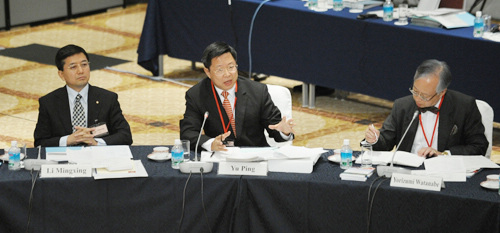|
 |
|
REGIONAL TRADE: Yu Ping (center), Vice Chairman of the China Council for the Promotion of International Trade, speaks at the Second Asian Business Summit in Tokyo on September 29. The summit called for an open business environment in Asia (XINHUA) |

With the rise of emerging countries represented by China and some other countries, the current international trade system is embracing a reform. A prominent feature of this reform is the participation of an increasing number of countries and regions.
It is noteworthy that the repeated setbacks in the Doha Round talks are a vivid reflection of the difficulties of the reform. The Doha Round, which World Trade Organization (WTO) members started in November 2001 with the aim of lowering trade barriers around the world, has not been completed yet. The talks also exposed the problems of the current international trade system.
The current international trade system was established within the frameworks of the General Agreement on Tariffs and Trade and its successor, the WTO. It has served as a significant pillar for the sustained and stable growth of the world economy after World War II. Also, it has greatly promoted economic globalization and trade liberalization. Thanks to its orderly operation over the past decades, the overall environment of international trade has been dramatically improved. The size of the world economy, as well as international trade volume, has grown exponentially.
However, now this system has numerous problems. A major problem is the conflict between developed countries and developing countries. Developed countries control the decision-making system and the setting of standards, while developing countries are in a subordinate position. The pattern has created a big difference in the power exercised by the two camps.
Traditional sensitive issues pose another problem. On the one hand, developed countries won't stop offering export subsidies to their own agricultural products. But on the other hand, they force developing countries to open up markets. This has caused dissatisfaction among developing countries. These issues not only put WTO members' economic interests at stake, but may also affect their security and stability. However, they have never been solved.
Burgeoning regional trade cooperation also calls for reform in the international trade system.
In addition, the current trade system has not successfully curbed trade protectionism. Protectionism practiced by a number of countries and regions has hindered the progress of the reform.
As a major participant of international trade and an active force in trade system reform, China seeks a reasonable, fair and equitable international trade order, while strengthening cooperation with other developing countries.
China advocates reaching its goals through well-planned and efficient reform based on equality and harmony, instead of a revolutionary subversion. China insists the reform should be carried out under the principle of maintaining the positive parts and abandoning the negative parts of the traditional system.
A major reason for difficulties in the Doha Round is developed countries' long-term dominance over the multilateral trade system and decision-making for negotiation targets.
China's participation will change the traditional dynamic in the system, with more importance attached to protecting the interests of developing countries as well as less developed countries.
| 